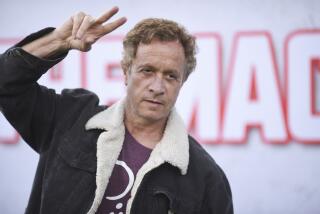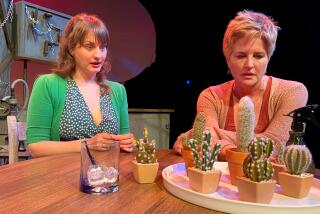Steve Allen Theater (of the absurd)
ALOVE scene between logophiles: “I want to put my words in your mouth,” the woman says. “I want to put my words all over your face.”
The man is silent.
Woman: “Could you just say something?” Pause. “Anything.”
Man: “I voted absentee last year?”
Woman: “I love that.”
FOR THE RECORD:
‘Tomorrow Show’: An article on the Steve Allen Theater in Sunday Calendar’s Arts & Music section said that “The Tomorrow Show,” a variety program at the theater, is presented Fridays at midnight. It plays at midnight Saturdays. —
Claire Titelman and Josh Fadem are rehearsing their upcoming show, “Claire and Josh Hate Themselves but Love Each Other,” an absurdist sketch comedy about “wordvert” romance. Afterward, Amit Itelman, artistic director of the Steve Allen Theater, sits with the two performers in the 99-seat space. Fadem wonders if some of the piece’s later material needs to be darker. Not darker, says Itelman. Deeper. “You’re taking the audience on a journey to the other side of the tunnel. We want to see you really living the experience of this relationship.”
A few days earlier, Itelman had been the first in line to be slapped by the Poubelle Twins, professional wrestlers/burlesque dancers, just before a screening of David Cronenberg’s “Crash.” Why the slapping exercise? “Because the movie examines the connections between violence and sexual gratification,” says Itelman. “I thought it would be interesting to explore those themes in a direct manner.” And the smack? “It really, really hurt. But I have to say, the majority of the audience chose to get slapped.”
The bar for eccentricity may be pretty high in Hollywood, but the Steve Allen Theater clears it easily. Let’s start with the location: the basement of the Center for Inquiry West, a clunky edifice sitting on a typically schizophrenic stretch of Hollywood Boulevard whose neighbors include the Barnsdall Art Park, a Goodwill store and Cheetah’s strip club.
By day, CFI West serves as an outpost for the national advocacy group founded to promote reason and the scientific method. The organization, which publishes Skeptical Inquirer magazine, has its roots in the mid-’70s, when the mysticism of “Chariots of the Gods” and Uri Geller had reached epidemic proportions. CFI’s L.A. branch presents lectures on science, hosts a non-theological version of AA, and even pays house calls to examine claims of paranormal activity.
By night, CFI is the scene of uncategorizable performance acts held in a frumpy auditorium, an unlikely lab for some of the freshest, strangest work in town.
“At first I thought it was a horrible place,” says comic Craig Anton, who hosts a variety program at the Steve Allen, “The Tomorrow Show,” Fridays at midnight. “The lobby looks like a community college theater snack bar. The stage reminds me of my elementary school.”
Then there are the names of immortal skeptics such as Spinoza and Galileo emblazoned along the wall. “Yeah,” Anton says with a laugh. “People constantly ask, ‘Now are you involved in this religion?’ ”
If anything, Itelman’s artistic credo reflects CFI’s mission of “not accepting things as they are,” says mentalist Max Maven, who for several seasons has performed at the theater. “It gives permission for a certain idiosyncrasy.”
This summer’s lineup includes vintage music “archaeologist” Janet Klein playing lost barrelhouse jazz and ragtime. Duncan Trussell is developing a show about the science of happiness. And beginning June 7, former carny Aye Jay will tell stories about growing up on the carnival circuit. (Yes, there was a reason you were creeped out as a child.)
The bearded, ever-buoyant Itelman, 33, has spent time feeding the Hollywood development machine, having worked for Comedy Central and at HBO’s Workspace. “Every show or sketch was put on as a way to market a sitcom. It was a microcosm of L.A. theater in general.”
He jumped when CFI West’s Executive Director Jim Underdown called to ask if he wanted to run their new theater. “I saw the Steve Allen as an opportunity to provide a space for theater that exists for the performance moment alone,” Itelman explains. “I want to produce shows that challenge current ideas about what’s acceptable to put on stage. And that doesn’t necessarily mean subversive or dark.”
Although it can. Among the Steve Allen’s first productions was “Hollywood Hell House,” a send-up of a fundamentalist preacher’s scare-the-kids-straight-to-heaven kit. Audiences were led through a series of lurid rooms, each depicting sinners facing damnation for a “sin” (homosexuality, drunk driving, teen suicide). Celebrities lined up to skewer the fear-mongering: Sarah Silverman screamed her head off on an abortion table; Bill Maher played Satan. Eventually the fire marshal closed them down, but not before the event drew national -- even a smattering of international -- press.
“We thought it was great to have the attention,” says Barry Karr, executive director of CFI, speaking by phone from national headquarters in Amherst, N.Y. “It put us on the map in L.A. But when I went out there a few months later, I thought, ‘My God, they trashed the place!’ Props were still lying around. The carpet had fake bloodstains.”
You win some . . .
THAT MESSY, go-for-broke vibe has led to mixed results. There were packed houses for Julien Nitzberg’s irreverent Gilbert & Sullivan-style satire on post 9-11 paranoia, “The Beastly Bombing,” which went on to play in New York and Chicago. Then there was the time composer Graham Reynolds (“A Scanner Darkly”) came to perform an original score for a screening of “Battleship Potemkin.” “He arranged for a small orchestra. We got press, everything,” says Itelman. “Five people showed up.”
There is a curious nostalgia to Itelman’s taste, and it turns out he’s a first-generation immigrant. His Russian father paints, his Israeli mother is a sculptor. His parents, he says, have absolutely no feel for American pop culture, and in many ways there’s an old-world sensibility to his own sense of showmanship. He recently directed a short film, “The Final Kiss,” a twisted romance in the style of Grand Guignol, where the notion of swapping spit takes on new meaning. Itelman is not above the gross-out.
One of his early jobs was working for the special-effects outfit Amalgamated Dynamics. He speaks lovingly of Rick Baker, John Carpenter’s “The Thing” and “Clash of the Titans.” “I’m a fan of rubber and goo, of getting your hands dirty. Before CG, the artistry of special effects wasn’t perfect -- you allowed yourself to see the seam line -- but that didn’t diminish the effect. How do you make a dog expand into an alien creature? It was like extreme puppetry. The imagination is allowed a little more leeway.”
An informed audience
YOU COULD say the Steve Allen Theater celebrates the seam line: an acceptance of artists in the middle of their process may be the hallmark of this clubhouse-cum-human science fair. Last season, surreal humorist Emo Philips tried out new material after a long break from performing. “He sat in a director’s chair with a notebook of material,” remembers Max Maven. “If a joke didn’t work, he just tore out the page, crumpled it up, and threw it away. The audience got the experiment.”
Canadian alternative-comedy group Kids in the Hall built its latest national tour at Steve Allen, and consider the theater their West Coast home. “The audience here comes expecting something challenging, but they’re very open-minded,” says Kids member Dave Foley. “They’ll let you risk taking your time. You can fool around looking for what works without having to fear you’re losing the crowd. That’s a luxury for performers.”
For Itelman, the process is as revealing as some imagined “finished” product. Take “Claire and Josh,” which will have a workshop run Monday. The show is “a breath of fresh air for me,” he says. “It’s unusual to see comedians willing to be honest and vulnerable in a way that doesn’t compromise their comedic chemistry. I’ve just become more interested in performance that addresses the human experience more directly, that doesn’t rely on traditional theatrical tools. I think we’re all trying to figure out just what that might look like.”
More to Read
The biggest entertainment stories
Get our big stories about Hollywood, film, television, music, arts, culture and more right in your inbox as soon as they publish.
You may occasionally receive promotional content from the Los Angeles Times.






